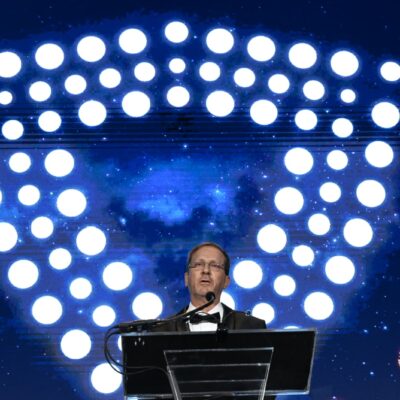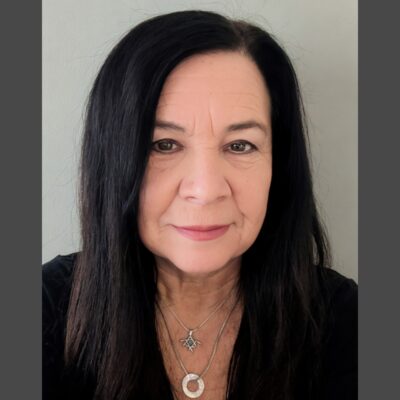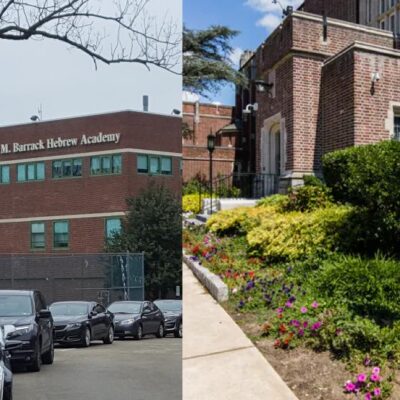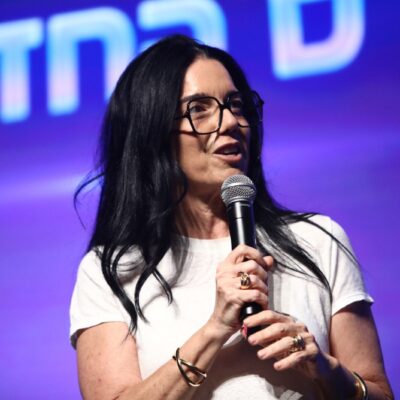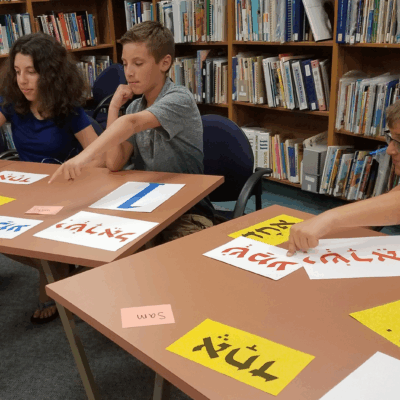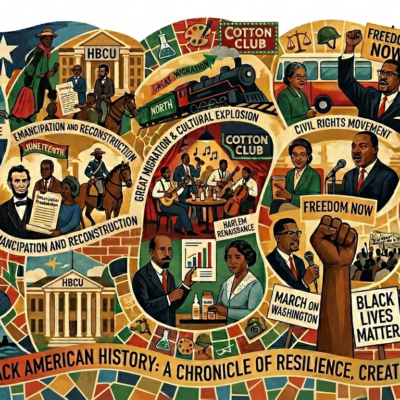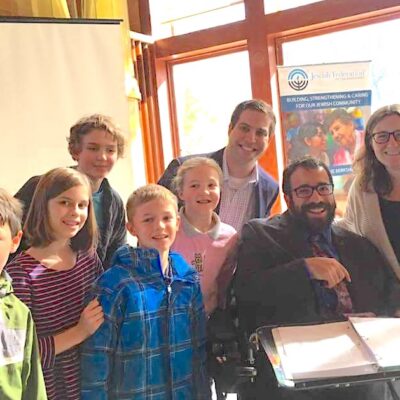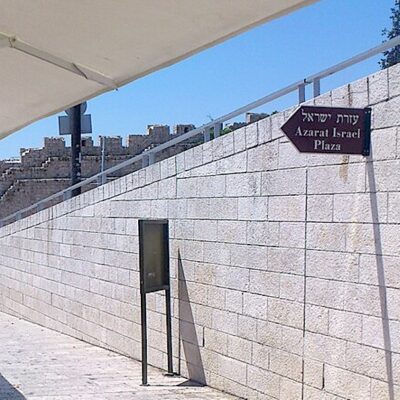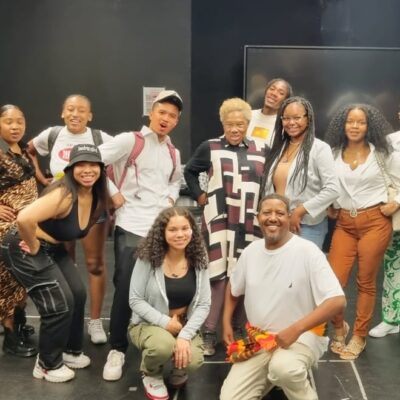NOT JUST SPORTS
New program looks to use JCCs’ connection to underserved populations to combat antisemitism
JCC Association, Brandeis University and Boundless Israel train representatives from 25 JCCs across the United States to fight 'Jew hatred'

Erin Clark/The Boston Globe via Getty Images
Brandeis University in Waltham, Mass.
Walk anywhere on the Brandeis University campus and you will catch sight of the university seal, a blue and white shield stamped in the middle with the word “Emet,” truth in Hebrew. Encircling the shield is a quote from Psalms: “Truth even unto its innermost parts.”
With so much disinformation circulating about Israel’s war with Hamas and uncertainty as to what constitutes antisemitism, the seal’s message about seeking the truth set the tone for the recent “Navigating Israel and the Rise of Antisemitism” seminar, a partnership between JCC Association of North America, Brandeis University and Boundless Israel, which was held at the university from July 14-17 and was attended by 50 JCC leaders representing two dozen JCCs across North America.
In a post-Oct 7 world, with Israel’s right to exist often delegitimized and Jew hatred throbbing, the JCCs are looking to serve as a voice of truth for Jewish and non-Jewish members, Rabbi David Kessel, JCC Association of North America’s senior vice president and director of Mandel Center for Jewish Education, told eJewishPhilanthropy.
In North America, there are 172 JCCs serving over 1.5 million people every week, a third of whom are not Jewish.The Jews who are members are often not connected to other Jewish organizations or temples. For the JCC Association and the partners on this project, that makes JCCs a key vector in addressing an underserved population.
“That is an incredible opportunity to humanize Jews, Judaism and the Jewish state to a group of individuals who may not interact with the Jewish community in any other way,” Rachel Fish, special adviser to the Brandeis University Presidential Initiative to Counter Antisemitism in Higher Education and co-founder of Boundless, a think-action tank looking to revitalize Israel education and combat Jew hatred, told eJP.
After Oct. 7, JCC executives found themselves struggling. While many members supported their JCC’s pro-Israel activism, some members voiced opposition to the lobby exhibits calling attention to the hostages taken by Hamas into Gaza. Others felt that JCCs should be doing far more for Israel.
“How do you address the challenge of a child in the preschool program who’s wearing a ‘Free Gaza’ T-shirt,” Kessel asked. “Our local executives and local professionals were saying, ‘We need help. The world is changing. We’re dealing with challenges that we’ve never addressed before, and we need to get together and figure out what to do.”
Brandeis provided “a very important backdrop, because it makes it clear that you are here to learn,” Fish said. “It’s very different than meeting in a hotel conference room.”
Every JCC that was involved in the seminar sent two senior employees, so they could return “armed with common language,” Kessel said. Having multiple employees to brainstorm plans was important because every JCC has to cultivate strategies specific to their communities.
Fully funded by the university, the seminar featured presenters, many who were Judaic studies scholars, from Brandeis, Smith College, Indiana University Bloomington, Hebrew College, the Constructive Dialogue Institute and Scholars for Peace in the Middle East, among others.
The seminar provided “an academic deep dive” into the history of antisemitism and how it connects to Israel, Kessel said. Attendees learned how to support and nurture “a big tent community” with diverse perspectives on these topics.
One of the core themes was that using the term antisemitism can be confusing for people who may not understand how it manifests in the 21st century. “What we learned is, call it what it is, and it is simply Jew hatred,” Jason Kunzman, CEO of JCC of Greater Pittsburgh, told eJP. “Everybody understands the term Jew hatred.”
There were representatives from Fuente Latina and National Black Empowerment Council presenting and a focus on how to cultivate allyship. “You don’t solve antisemitism only by focusing on educating Jews,” Fish said. “Antisemitism, Jew hatred, very much, is a non-Jewish problem, and you need to build meaningful relationships and understanding of this issue with the non-Jewish community.”
Participants discussed the wealth of opportunities to educate members through bringing in speakers, writing opinion pieces and organizing arts and culture events. Since the seminar, many executives have written blog posts and sent emails to their members reflecting on what they learned.
“Everybody felt like it is our role and responsibility as Jewish community leaders to stand up and make our voices heard and address these challenges,” Kessel said. “We need to be those change agents… It was more than professional development. It was professional development with a purpose.”
After the seminar, Sue Gelsey, chief engagement officer of the Kaplen JCC on the Palisades in Tenafly, N.J., began planning a seminar on Jew hatred for the Palisades community, as well as sessions focusing on educating parents and kids. Her JCC has increased focus on interfaith work and strengthened Jewish programming throughout their camp and early childhood programming.
“As a Christian, I have found the Israel-related initiatives and the signs around the JCC to be incredibly inspiring,” Allyson Carolan, a member of the Kaplen JCC on the Palisades, told eJP. “They remind us of our shared heritage and foster a deeper understanding and respect among all of us. It’s heartwarming to see how these efforts not only educate but also strengthen our sense of connection and belonging, regardless of our backgrounds.”
Two weeks after the seminar, the JCC of Greater Pittsburgh, a community that went through the deadliest antisemitic attack in American history in 2018, partnered with other local Jewish organizations and an interfaith organization to bring Shufuni, young musicians from the Gaza Envelope, to perform. In 2025, they are scheduled to host the JCC Maccabi Campus Games. The seminar reinforced how important this work was, Kunzman said.
“One of the big outcomes was reaffirming our commitment to vibrant, engaged and active, proud Jewish communities,” Kessel said. “We don’t want to be in the business of fighting antisemitism. We’re in the business of growing and strengthening Jewish life.”

 Add EJP on Google
Add EJP on Google



